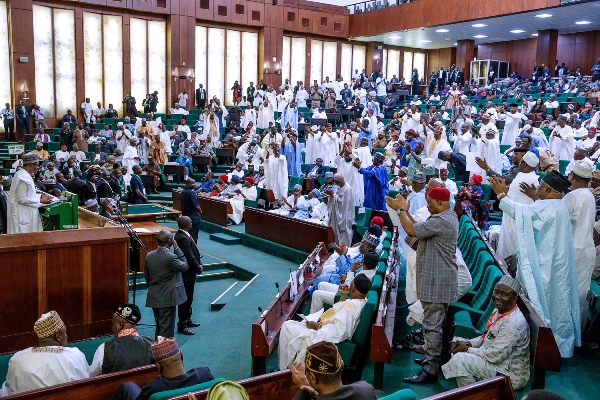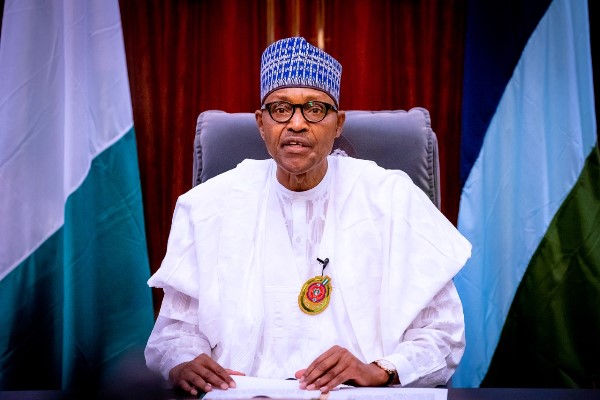Nigeria’s House of Representatives has approved the sum of N17.127 trillion budget for 2022 fiscal year.
The amount is against the sum of N16.391 trillion proposed in the budget estimates submitted by President Muhammadu Buhari.
The 2022 Appropriation bill was increased by N736 billion.
Breakdown of the budget showed that Statutory Transfer is to gulp N869.667 billion; Recurrent Expenditure of N6.910 trillion; Capital expenditure of N5.467 trillion and Debt Services of N3.870 trillion for the year 2022.
From the total of N10.741 trillion approved revenues, Share of Federation revenues stands at N5.526 trillion; N2.216 trillion as Independent revenues; N195.716 billion as dividends; N62.377 billion as Aid and Grants; N300 billion as Special Funds/Accounts – Receipts; N1.728 trillion as Government-Owned Enterprises (net of Operating Surplus)
The House also approved the 1.88mbpd as daily oil production; $62 oil benchmark price; N410/$ exchange rate; 4.2% GDP growth rate and 13% inflation rate for the 2022 fiscal year
Under the Statutory transfers, National Judicial Council is to get N120 billion; Niger Delta Development Commission – N102.783 billion; Universal Basic Education – N112.287 billion; National Assembly – N139 billion; Public Complaints Commission – N11.190 billion.
The Independent National Electoral Commission (INEC) – N219.544 billion; National Human Right Commission – N4.500 billion; North East Development Commission – N48.076 billion; Basic Health Care Fund – N56.144 billion and National Agency for Science and Engineering (NASENI) – N56.144 billion, respectively
Breakdown of the National Assembly budget showed that the sums of N19.116 billion is National Assembly Office; N33.267 billion – Senate; N51.995 billion for House of Representatives; N7.734 billion for National Assembly Service Commission; N9.602 billion for Legislative Aides; N118.970 million for Senate Public Account Committee; N142.764 million for House Committee on Public Account; N8.308 billion for General Services; N7.374 billion for National Institute for Legislative and Democratic Studies (NILDS); N471.335 million for Service Wide Vote; N581.848 million for Office of Retired Clerks and Permanent Secretaries; N125 million for Senate Committee on Appropriations and N165 million for House Committee on Appropriations
The sum of N100 billion was also approved for Zonal Intervention Projects; N10 billion for National Assembly liabilities; N300 million for National Assembly e-Library; N139 million for National Assembly Dashboard; N1 billion for Constitution review and N20 billion for Special Intervention projects.
Under the Recurrent (Non-Debt) Expenditure, the House approved the sums of N350 billion for National Social Investment Programme (NSIP); N4 billion for Employee Compensation Fund; N30 billion Contingency (Recurrent); Treasury Single Account (TSA) – N1 billion; N50 billion for Police Operations Fund; N50 billion for Hazard Allowance for health workers.
The sum of N50 billion is for Enhanced Allowance for Nigeria Police; N300 billion for national Poverty Reduction with Growth Strategy (FG commitment, including NSIP upscaling); N40 billion for settlement of MDAs electricity bills debt; N65 billion for Presidential Amnesty Programme: Reintegration of transformed ex-Militants; N115 billion for military operations.
Others are Lafiya Dole and other operations of the Armed Forces; N1 billion for severance benefits to retired Heads of Government Agencies and parastatals; N2.300 billion for entitlements of former Presidents/Heads if States and Vice Presidents/Chief of General Staff; N125 billion for Pension Protection Fund; N10 billion for benefits of retired Heads of Service and Permanent Secretaries an Professors; N11 billion for arrears of pension liabilities; N30.064 billion for defunct privatized agencies pension; N125 billion for payment into redemption fund.
The House also approved increase in the oil price benchmark from $57 to $62; increased the deficit by N98 billion to accommodate some other requests of national importance not provided for in the budget estimates and which could not be covered by the revenue increase.
Also during plenary, the House approved the extension of the implementation of the 2021 Appropriation Act by 90 days.
The resolution was passed sequel to the adoption of a motion sponsored by the Majority Leader, Hon. Alhassan Ado-Doguwa urged the House to extend the implementation of the 2021 Appropriation Act by 90 days.
The House also approved the virement of N276.757 billion from the N13.588 trillion approved in the 2021 Appropriation Act as well as N983 billion approved in the Supplementary Appropriation Act, on July 26″, 2021.













